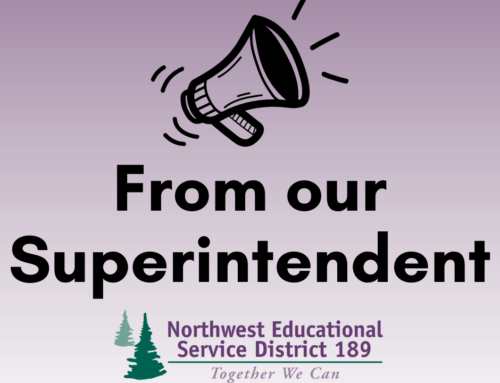As part of the Northwest Educational Service District 189 (NWESD) staff and as a result of frequently visiting regional classrooms, I recognize how educators are expected to design and develop differentiated instruction, develop strong relationships with all students, shape parent and community involvement, participate in professional learning on multiple fronts all with a sense of urgency and focus.
In his New York Times Bestseller, The One Thing, Gary Keller asks, “What’s the ONE Thing you can do such that by doing it everything else will be easier or unnecessary?” He asserts “that no matter how success is measured, personal or professional, only the ability to dismiss distractions and concentrate on your ONE Thing stands between you and your goals. The ONE Thing is about getting extraordinary results in every situation.”
So what does focusing on the one thing have to do with School Improvement? My work with the NWESD School Improvement Team reminds me that productive change happens in increments and that sometimes we must go slow to go fast. I also understand that collaborative, collective, and shared goals offer me the support necessary to create productive change.
Some examples of overall shared goals are to:
- Increase SBA scores in Math
- Increase SBA scores in English Language Arts
- Increase Graduation Rate
- Create a Climate of Success
Schools can’t get to these overall goals without focusing on the one thing which is building positive student and staff relationships in each school.
Why is this so important? Collaborative teacher teams with strong relationships and focus is necessary to get the work done to increase scores, graduation rate, and create a climate of success. Jones (2014) in her article The Power of Teacher Collaboration identifies teacher collaboration as a way to raise student achievement. Three of her tips for successful collaboration are:
- Build relationships
- Find Time to Collaborate
- Share Responsibility
Strong relationships between staff and students will also be an important foundation for increasing scores, graduation rate and creating a climate of success. Strong teacher-student relationships are ranked high on Hattie’s 2018 list of strategies that impact achievement. Keren Sofer (2018) a psychologist and former teacher on the benefits of “attachment theory” in schools, shares her story on The Key to Student Success? Relationships.
How to keep the “one thing” as the focus
- Incorporate the goal into your School Improvement Plan
- Determine what each person in your organization will be doing daily to reach the one goal of building relationships.
- Create a system to monitor your progress on the goal.
Often, it’s the foundational elements that move our academic goals that go unnoticed. With ever-increasing demands on educators to increase academic progress, it’s easy to overlook the human fundamentals that move the work and make it easier and more enjoyable.
Learn more about NWESD School Improvement strategies.




